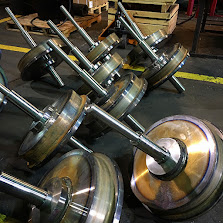Industrial operations rely heavily on equipment that can perform under pressure, endure harsh conditions, and maintain consistent output. Whether it’s material handling, furnace systems, mining operations, or kiln car movement, the wheel assemblies powering these systems play a crucial role in overall productivity. Among the various wheel options, forged steel wheels stand out for their durability, dependability, and long-term value.
Forging involves shaping metal through compressive forces, resulting in a dense and uniform grain structure. This manufacturing method significantly enhances the performance characteristics of the wheel. Below are five key benefits that highlight why forged steel wheels are preferred for demanding industrial environments.
1. Exceptional Strength and Load-Bearing Capacity
Forged steel wheels are renowned for their exceptional strength, derived from the forging process that compacts the internal structure of the metal. This results in superior mechanical properties compared to cast or fabricated alternatives. Industries that manage heavy loads, such as mining, power transmission, foundries, and steelmaking, benefit greatly from this strength. The wheels can withstand intense pressure without deforming or failing, ensuring safety and operational continuity.
2. Superior Resistance to Wear, Abrasion, and Impact
Many industrial settings expose wheels to abrasive surfaces, metal tracks, debris, and uneven paths. Over time, cast or fabricated wheels may crack, chip, or wear out prematurely. Forged steel wheels, however, excel in resisting surface degradation thanks to their dense, uniform microstructure. This wear resistance translates into longer service life and more stable operation. Their ability to handle continuous impact loads also makes them suitable for industries with repetitive high-stress movement.
3. Performance Stability in High-Temperature Environments
Certain industrial processes, such as tunnel kilns, furnaces, heat-treatment facilities, and ceramic manufacturing, involve exposure to elevated temperatures. Many materials lose structural integrity when subjected to extreme heat, but forged steel wheels retain their strength and form under such conditions. This thermal stability ensures smooth operation even when exposed to fluctuating temperatures, reducing the risk of deformation or performance issues.
4. Lower Maintenance Requirements and Long-Term Cost Efficiency
Equipment failures and frequent repairs can disrupt production and increase operational expenses. Forged steel wheels help mitigate these issues by offering durability that significantly reduces maintenance needs. Their resistance to wear and damage means fewer replacements, minimal downtime, and improved equipment lifespan. Although they may involve a higher initial investment compared to other wheel types, their long-term cost efficiency makes them a practical choice for industrial operations focused on reliability and productivity.
5. Customization Options for Specific Industrial Needs
Every industrial application is unique. Track dimensions, load requirements, temperature conditions, and environmental factors vary considerably across industries. Forged steel wheels can be customized through machining, heat-treating, profiling, and precision engineering to meet these specialized demands. This flexibility makes them suitable for a wide range of applications, from material handling systems and kiln cars to mining carts and furnace components.








